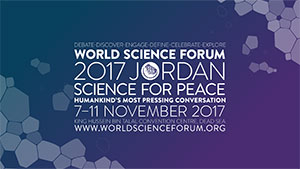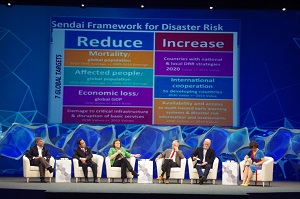


For the first time, IAP played a significant role in developing the agenda of the World Science Forum (WSF). IAP for Science co-chair Krishan Lal was appointed to the Steering Committee, while Coordinator at the Trieste secretariat, Peter McGrath, was appointed as a technical member of the committee. This helped ensure that IAP-nominated speakers were present throughout the plenary sessions of the Forum, and that several thematic sessions included an IAP theme.
Young Scientists
.jpg) The week at the Forum, hosted by the Royal Scientific Society on the shores of the Dead Sea, kicked off with a special event on 6 November for a group of young scientists.
The week at the Forum, hosted by the Royal Scientific Society on the shores of the Dead Sea, kicked off with a special event on 6 November for a group of young scientists.
More than 50 young scientists attended the full day pre-WSF workshop on ‘Avoiding the Weaponisation of Research’, selected to fit closely with the main theme of the Forum, ‘Science for Peace’. As well as members of the Global Young Academy (GYA), the World Association of Young Scientists (WAYS) and the International Consortium of Research Staff organizations (ICoRSA), travel costs for 20 young scientists nominated by IAP member academies were covered either by IAP (for those from developing countries), or by their member academies (from developed countries).
The workshop unfolded through a series of training exercises, as well as the development of ‘pitches’ on the theme of ‘avoiding weaponisation’. At the end of the day, seven teams presented each presented 3-minute pitches to an invited panel of experts. A pitch proposing the establishment of an international organization to regulate Bitcoins and other e-currencies was selected as the winner – and earned the right to pitch in the young scientists’ plenary session (see below). Several of the ideas developed are currently being followed up by the teams of young scientists and built into potential articles for publication or project proposals.
Opening Ceremony
The World Science Forum itself kicked off on 7 November with an extravaganza, transmitted live on Jordanian television, featuring King Hussein Bin Talal of Jordan presenting 14 Jordanian scientist with prizes for their research contributions. As well as song and dance performances from Jordanian artistes, there was also a video message from three astronauts currently circling the Earth on the International Space Station.
Among the sessions IAP and its representatives were involved in was a plenary session on ‘Science and Food Security: How to Feed the World Sustainably and Equitably’. Joachim von Braun (EASAC) joined speakers from the European Commission and African Union and provided a short overview of the main conclusions of the IAP Food and Nutrition Security and Agriculture (FNSA) project. The session was attended by His Royal Highness, Prince El Hassan Bin Talal of Jordan and moderated by Vladimir Šucha, Director-General of the European Commission’s Joint Research Centre (JRC).
IAP sessions
Immediately following, IAP presented more details of its FNSA project, with presentations by Paul Moughan (Asia/Pacific: AASSA), Endashaw Bekele (Africa: NASAC), Eduardo Bianchi (the Americas: IANAS) and Robin Fears (Europe: EASAC), chaired by Joachim von Braun. The four speakers previewed the main conclusions contained in four regional reports that are currently being finalised and are due to be published in the next month or two.
Alongside the Minister of Education of Jordan, Omar al Razzaz, in the session on ‘Promoting Inclusion through Science Education, Outreach and Engagement’ was the Minister of Science, Technology and Innovation of Education of Malaysia, Wilfred Madius Tangau. Dato Lee Yee Cheong, chair of IAP’s Science Education Programme’s Global Council, is education advisor to minister, was also in attendance. Also on the panel was Gloria Bonder of UNESCO, who raised issues concerning the teaching of girls in schools, and Orakanoke Phanraksa from Thailand, former GYA co-chair and outgoing GYA representative on the IAP SEP Global Council.
IAP’s regional network for Europe, EASAC, hosted a session on ‘Science-based advice to policy-makers in an era of alternative facts’. The session was chaired by Thierry Courvoisier (president, EASAC), with Bill Sutherland (Miriam Rothschild Professor in Conservation Biology, University of Cambridge, UK) providing the keynote speech. Discussants included Roseanne Diab, Executive Officer, Academy of Science of South Africa (ASSAf), Rolf Heuer, chair of the High Level Group of scientific advisors to the European Commission's new Scientific Advice Mechanism (SAM), László Lovász, President, Hungarian Academy of Sciences and Vladimir Šucha.
IAP also joined with the GYA and UNESCO to host a session on ‘Empowering scientists and society to support the SDGs: a MENA perspective’. Chaired by IAP project director, Tracey Elliot, panellists included Muhammad Saidam, Chief Scientist, Royal Scientific Society; Eva Alisic, former GYA co-chair and senior research fellow, Monash University, Australia; Manfred Lange, Director, MENA Regional Centre, Future Earth MENA Regional Centre; and Isil Kurnaz, WG Leader, Gebze Technical University.
The young scientists attending the pre-WSF workshop put together a session – the first ever plenary session at a WSF to be organised by young scientists. The theme was: ‘Young Researchers Identify Skills of the Future to Advance Science Diplomacy and Society’.
 Another IAP-nomiated speaker was Virginia Murray, Public Health England and formerly of UNISDR S&T group. She spoke in the session on ‘Building Resilience in an Interconnected World’ alongside Peter Thomson, United Nations Secretary-General's Special Envoy for the Ocean, United Nations General Assembly; Haruo Hayashi, President, National Research Institute for Earth Science and Disaster Resilience; Paulo Artaxo Netto Institute of Physics, University of Sao Paulo, Brazil; and Carthage Smith, Lead Coordinator, Global Science Forum, OECD.
Another IAP-nomiated speaker was Virginia Murray, Public Health England and formerly of UNISDR S&T group. She spoke in the session on ‘Building Resilience in an Interconnected World’ alongside Peter Thomson, United Nations Secretary-General's Special Envoy for the Ocean, United Nations General Assembly; Haruo Hayashi, President, National Research Institute for Earth Science and Disaster Resilience; Paulo Artaxo Netto Institute of Physics, University of Sao Paulo, Brazil; and Carthage Smith, Lead Coordinator, Global Science Forum, OECD.
IAP was then represented by IAP for Research co-chair, Daya Reddy (South Africa) in the final plenary session on ‘Science Diplomacy to Strengthen Governance and Build Enduring Relationships’. Reddy explained how IAP feeds scientific information into policy discussions, especially at regional and global levels, through its various statements and reports developed by collaborationg national academies.
Declaration
The WSF itself came to a close on 10 November with the release of a Declaration, presented by HRH Princess Sumaya bint El Hassan, the Forum’s lead organizer, that focused on five main issues: